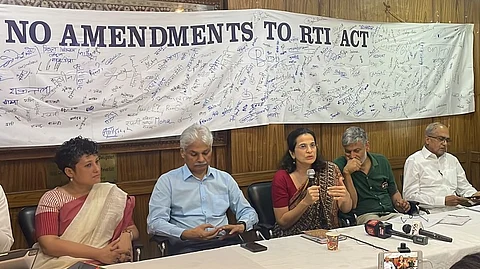

The central government's refusal to amend the Digital Personal Data Protection Act, 2023, has sparked concerns among journalists, whistleblowers and RTI activists
Press bodies demand legal amendments, not verbal assurances
RTI activists say the law enables blanket denial of personal information
Experts warn of selective application, surveillance and threat to democratic transparency
Whistleblower Protection Act still non-operational, DPDP seen as regressive step
The central government has refused to amend the Digital Personal Data Protection (DPDP) Act, 2023 to exempt journalists, whistleblowers and civil society members, according to civil society members.
Representatives from media and rights groups who met the Union Ministry of Electronics and Information Technology (MeitY) on July 28, 2025 raised concerns that the Act could severely curtail efforts by journalists, whistleblowers and activists to hold the government accountable.
Sangeeta Barooah Pisharoty, vice-president of the Press Club of India, noted that earlier drafts of the legislation explicitly exempted journalistic activities. “These exemptions, which existed until the last draft, were removed when the Act was passed. That cannot be an oversight,” she said at a press conference in Delhi on July 30, 2025.
Pisharoty was speaking during the Roll Back RTI Amendment Campaign in Delhi.
She added that while the MeitY secretary verbally assured them that the law would not apply to journalists, such statements carried no legal weight. “Press bodies have demanded an amendment or a clear exemption in the rules. A verbal assurance is meaningless in law.”
Pisharoty also pointed out that the DPDP Act, in conjunction with recent amendments to the Right to Information (RTI) Act, would limit journalists’ ability to access crucial public records, impacting their work.
Noted lawyer Prashant Bhushan criticised the law for failing to protect whistleblowers. “If someone exposes corruption and names officials, they could now be prosecuted for violating the DPDP Act,” he said. “Such a law is acceptable if restricted to companies and entities dealing with data, but it should not be applicable to journalists, individuals and civil society members,” he said at the conference.
Bhushan warned that the law gives sweeping powers to the central government, allowing it to weaponise and selectively apply it against critics or individuals raising issues that hold the government accountable.
In a joint press statement, Anjali Bhardwaj, co-convenor of the National Campaign for People's Right to Information (NCPRI), said the DPDP Act severely amends the RTI Act by exempting all personal information from disclosure — effectively allowing authorities to blanket reject requests that are critical for public accountability. This includes requests for names and other identifying details to ensure accountability.
“For instance, seeking the names of contractors who built collapsed bridges or roads, or the names of wilful loan defaulters, will not be allowed,” Bhardwaj said. “The DPDP Act designates any person processing personal information as a ‘data fiduciary’, imposing significant compliance burdens and in its current form, it provides no exemption for the press.”
Nikhil Dey, co-convenor of the NCPRI, said the government had diluted Section 8(1)(j) of the RTI Act, previously a nuanced provision balancing privacy with transparency. “The DPDP amendment encourages opacity. It will prevent people from monitoring welfare schemes or uncovering corruption and human rights abuses.”
Terming the RTI Act a crucial tool for accessing important information to expose wrongdoing and corruption, including human rights abuses, he said the amendment encourages corruption and reduces transparency and accountability.
“The RTI Act has been extensively used by people to access information — including, at times, personal information — which is essential for seeking accountability and exposing corruption and human rights abuses,” He stated. “This will also undermine people's ability to collectively monitor welfare programmes and government work.”
Yashovardhan Azad, former information commissioner, described the DPDP Act as “the biggest attack on democracy” since it impedes the citizen’s fundamental right to information. “Corruption will thrive if people can’t access records. Instead of operationalising the Whistleblower Protection Act, 2014, the government has passed a law that strikes at the heart of transparency.”
Apar Gupta, director of the Internet Freedom Foundation, said the right to privacy is, conceptually, a right to limit the government's ability to surveil and interfere in people’s lives.
“In the garb of privacy and data protection, the government is diluting crucial rights. The excessive centralisation of power in the central government, whereby it can call for any information from a data fiduciary, can lead to mass surveillance,” Gupta pointed out.
Journalists could potentially be asked to disclose sources, civil society organisations working on accountability may be compelled to turn over all their information and whistleblowers could be asked to produce all documents in their possession, he added.
Gupta further pointed out that the Data Protection Board is effectively under the control of the central government — the appointment and removal of members and the chairperson, along with their salaries and benefits, are all determined by the Centre.
“Even the European Union law General Data Protection Regulation, which is one of the most stringent data protection laws, has carved out exceptions for journalists and for freedom of expression. The vagueness of this law renders it unconstitutional,” he added.